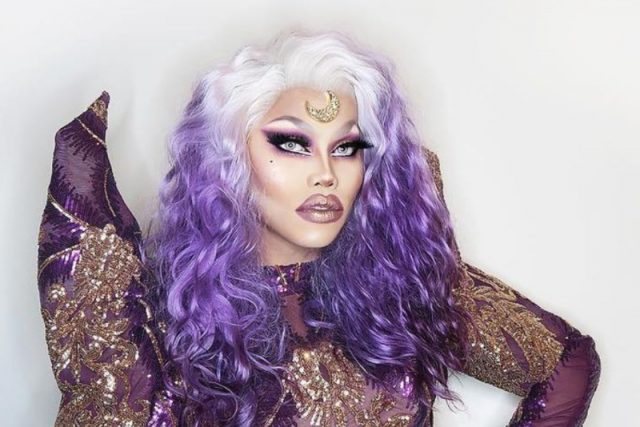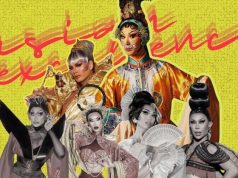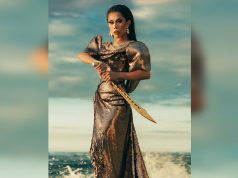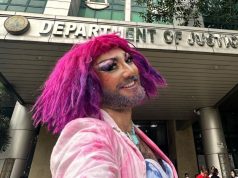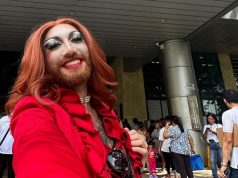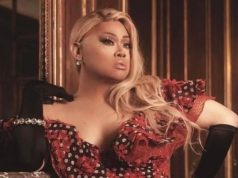“I became very self-conscious and hated the way I spoke.”
“RuPaul’s Drag Race” contestant Aura Mayari bared this on social media as among the struggles she had to endure as an Asian immigrant in the United States.
RELATED: ‘Your Filipina goddess’: Fil-Am drag queen Aura Mayari’s introduction wows local audience | ‘Serving Filipina moon goddess’: Fil-Am drag queen Aura Mayari joins ‘RuPaul’s Drag Race’ Season 15
“I am an immigrant. My family moved here to the US for a better life. My dad was lucky to get a contract in the US and got us visas and moved us here,” the Filipino drag artist wrote in a note on January 31.
Prior to migrating, she grew up in PILDERA, one of the villages in Pasay City and near the Ninoy Aquino International Airport.
“I grew up with nothing. We lived in a slum, a very poor neighborhood. There were many days when we didn’t have food to eat and my mom had to tuck me into our bed (the floor) hungry, telling me that there will be food to eat the next day,” Aura said.
“My dad worked his a** off and was able to get us out of there and eventually, moved to America, the [dreamland],” she added.
Yes, I am an Asian immigrant. pic.twitter.com/Y8sXjWMVTc
— Aura Mayari 🌙 (@AuraMayari) January 30, 2023
In another tweet, Aura said that she knew what she signed up for when she joined “RuPaul’s Drag Race.”
“I know signing up for the show I’ll be a punching bag for lots of hatred. But I’m also here to be a cushion for those who need it. Whether we like it or not, we are in the public eye and hopefully for this, we can extend ourselves to people who need to be heard,” she said.
Aura’s migration story soon resonated with several of her fans who are also Filipino immigrants.
Filipino drag queen Odasha Flop, a contender in “Drag Den Philippines” Season 1 also saw this statement on Twitter.
The drag queen from Parañaque City, however, reacted to the part about Aura’s previous residence in the Philippines.
“Omg taga-Pildera rin akis dati HAHAHAHAHAHAHA,” Odasha tweeted.
Omg taga pildera rin akis dati HAHAHAHAHAHAHA https://t.co/B2qjHba47k
— O-A 🍌🍆🪣🪩💣🐍🐴🔔🦎🧸👰🏾♀️👗👩🏽🦲7️⃣ (@odashaflop) January 31, 2023
Immigrant woes
Aura recalled that there are English words that she used to have difficulty uttering as a child.
She was made fun of because of this predicament. She remembered an incident where kids “mobbed” and made fun of how she would say certain words.
“I remember a bunch of kids mobbing around me asking me to say words, and would be laughed at for saying them incorrectly,” Aura said.
These experiences made the Chicago drag performer “self-conscious” of how she spoke at that time.
“I became self-conscious and hate the way I spoke. In high school, I hated doing presentations and my whole body would shake (visibly) every time I had to get in front of people to speak,” she said.
How Aura improved English pronunciation
To overcome it, Aura shared that she used to watch YouTube videos to learn the proper pronunciation of English words.
“I go online and type up words on YouTube just to hear how the words should be pronounced and I practice with it,” she said.
Over the years, Aura admitted that the anxiety of expressing herself in front of people remains with her.
“Until today, I stutter, I pause mid-sentence, [and] my heart would start beating so fast every time I have to talk. I get frustrated with myself because sometimes I can’t express myself fully because I have a hard time finding the right words to say. I grew [anxious] around this,” she said.
Aura was thankful to the other girls who helped her overcome these difficulties. They were able to console her and help her embrace this part of herself.
“’[RuPaul’s] Drag Race’ has really pushed me out of my comfort zone with all these interviews, press, and even the challenges on the show,” she said.
While the “Filipino moon goddess” drag performer has yet to surpass this struggle, Aura said that she merely laughs at herself nowadays.
“It is how it is,” she said.
“I’ve seen the worst in life and it taught me to be empathetic. I’m proud of where I am now and I will try to be a representative to those people who thought dreams were impossible,” Aura concluded.

